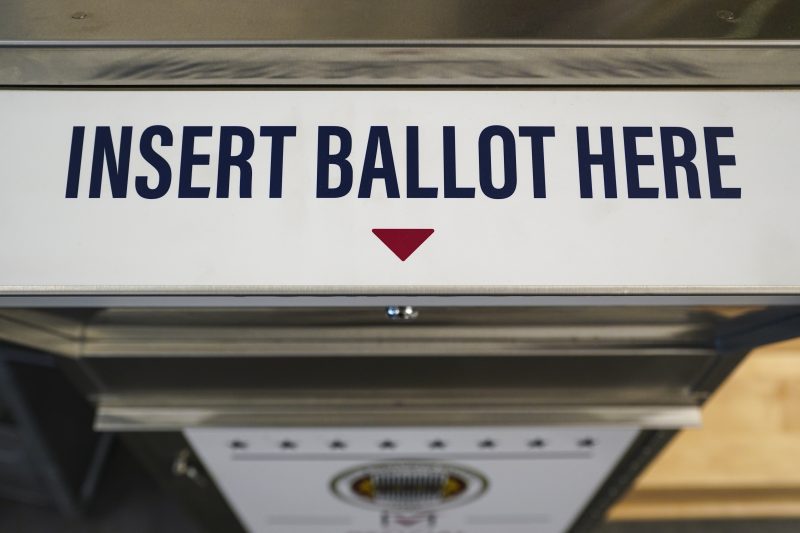Voters who make a disqualifying mail ballot error are entitled to cast a provisional ballot on Election Day at a polling place and have it counted, per a new court ruling.
Carter Walker of Votebeat
This article is made possible through Spotlight PA’s collaboration with Votebeat, a nonpartisan news organization covering local election administration and voting. Sign up for Votebeat’s free newsletters here.
Pennsylvanians must be given a chance to vote on Election Day if their mail ballots have been rejected because of a disqualifying mistake, the state Supreme Court ruled Wednesday.
That means voters who fail to correctly sign or date the return envelope or fail to use a secrecy envelope are entitled to cast a provisional ballot on Election Day at a polling place and have it counted, as long as that ballot wouldn’t be rejected for some other disqualifying issue.
In a 4-3 decision, the court said that provisional voting was meant to assure access to the right to vote, while simultaneously preventing double voting.
Justice Christine Donohue, writing for the majority, noted that the Republican litigants argued that in order to maintain election integrity, provisional ballots should not be counted, but said the majority was “at a loss to identify what honest voting principle is violated by recognizing the validity of one ballot cast by one voter.”
“If appellants presume that the general assembly intended to disqualify the provisional ballot of a voter who failed to effectively vote by mail in order to punish that voter, we caution that such a construction is not reconcilable with the right of franchise,” she wrote.
The American Civil Liberties Union of Pennsylvania and the Public Interest Law Center, which brought the case on behalf of two voters, celebrated the ruling as a victory.
“Today’s decision affirms that if you make a paperwork mistake that will keep your mail ballot from counting, you have the right to vote by provisional ballot at your polling place on Election Day,” said Ben Geffen, senior attorney at the Public Interest Law Center. “This reinforces the right to vote in Pennsylvania.”
The case began in Butler County, which rejected provisional ballots cast by two voters whose mail ballots for the April primary had been rejected earlier for being returned without a secrecy envelope. Provisional ballots are used at polling places by voters whose eligibility is in question but who still want to vote. Those ballots are counted only after the voter’s eligibility is confirmed, including a check to make sure no mail ballot from that same voter has already been counted.
The ACLU and Public Interest Law Center sued the county, arguing it had misinterpreted a section of the state’s Election Code in considering the rejected mailed ballots as “cast.”
The groups lost at the county court level, but that decision was overturned by the state’s Commonwealth Court in September. Republican groups that intervened in the case appealed it to the state Supreme Court. The ruling from the state’s highest court means it will apply statewide, not just in Butler County.
Pennsylvania law requires voters to sign and date their ballot return envelopes, and to place the ballot in an inner secrecy envelope before being placed in the return envelope, in order for the ballot to be counted.
Thousands of ballots are rejected each election for these issues. During the April primary, counties rejected roughly 8,500 ballots, or 1.22% of those returned, for lacking a signature, date, or being returned without a secrecy envelope, according to an analysis of Pennsylvania Department of State data.
The Pennsylvania Supreme Court recently declined to weigh the merits of the dating rule on an emergency basis, meaning it will likely remain in effect for at least the Nov. 5 election.
In a dissent joined by two other justices, Justice P. Kevin Brobson wrote that the state’s Election Code was “clear and unambiguous” that Butler County “not only lacked the authority to count Electors’ provisional ballots, [but] the Election Code expressly prohibited the Board from counting them.”
Neither Butler County Commissioner Kimberly Geyer nor Republican National Committee spokesperson Claire Zunk immediately responded to a request for comment.
The case is one of three major cases on mail ballots the high court could rule on before the election.
In another case from western Pennsylvania, the ACLU and the Public Interest Law Center sued Washington County over its policy of not notifying voters of errors with their mail ballots. That case is currently before the state Supreme Court, where a decision is pending.
Another case brought by the two groups deals with whether mail ballot return envelopes need to be dated in order for the ballot to be counted. The groups have brought several iterations of this case; the latest one began after a special election last month in Philadelphia for an open seat in the state House, when the groups sued the city on behalf of voters for not accepting improperly dated mail ballots cast in the race.
That case is awaiting a decision from the state’s Commonwealth Court, and could be appealed up to the state Supreme Court after that.
Carter Walker is a reporter for Votebeat in partnership with Spotlight PA. Contact Carter at cwalker@votebeat.org.
BEFORE YOU GO… If you learned something from this article, pay it forward and contribute to Spotlight PA at spotlightpa.org/donate. Spotlight PA is funded by foundations and readers like you who are committed to accountability journalism that gets results.
